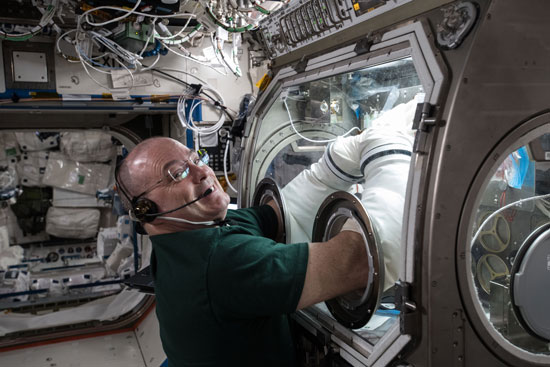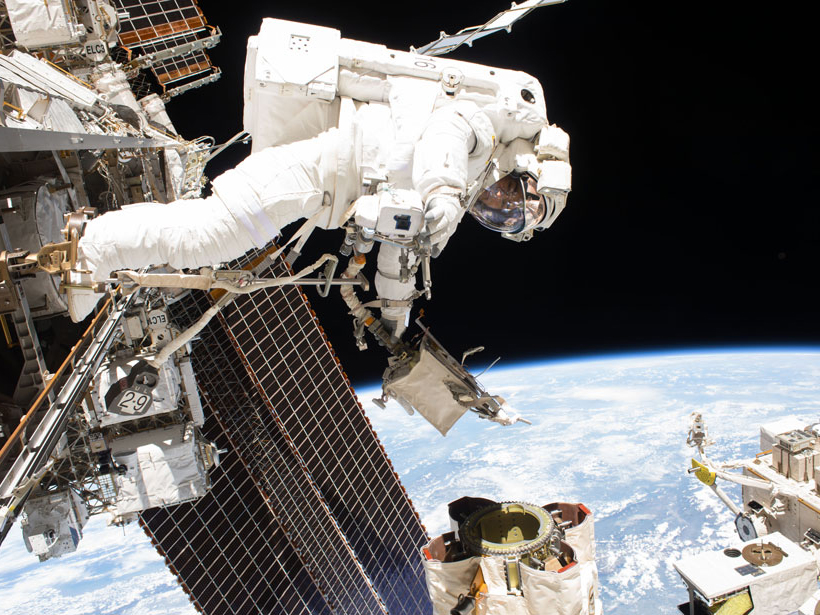The top Republican and Democratic senators on a key congressional subcommittee forcefully opposed on Wednesday a Trump administration proposal to end direct federal funding for the International Space Station (ISS) in 2025.
In a show of bipartisanship, Sens. Ted Cruz (R-Texas) and Bill Nelson (D-Fla.) argued at a hearing that ISS could still be a viable and important science laboratory until 2028 or beyond. They also stated that it is premature to end all direct federal funding for ISS in 2025 and that a 2025 date for ISS to transition to commercial operations is arbitrary and political.
“Let me be clear: As long as I am the chairman of the space subcommittee, the ISS will continue to have strong support and strong bipartisan support in the United States Congress.”
“Let me be clear: As long as I am the chairman of the space subcommittee, the ISS will continue to have strong support and strong bipartisan support in the United States Congress,” said Cruz. The senator is the chairman of the Senate Committee on Commerce, Science, and Transportation’s Subcommittee on Space, Science, and Competitiveness, which held the hearing. “And as long as Article I of the Constitution remains intact, it will be Congress that is the final arbiter of how long the ISS receives federal funding,” he continued.
The Trump administration’s budget for NASA for fiscal year 2019 proposes “to end direct Federal funding for the ISS in 2025.” The budget proposal also indicates that starting this year, NASA would “accelerate the process of transitioning to commercial approaches to ensure a seamless transition to this new operating paradigm as NASA leads a coalition of international and commercial partners to the Moon and then Mars and beyond.” Currently, ISS is authorized to continue its operations until 1 October 2024.
Avoiding a U.S. Leadership Vacuum in Low Earth Orbit
Cruz and Nelson, the only two senators speaking at the hearing, said that it is important to prepare for a transition as commercial space options and alternatives become more viable. However, they noted that transitioning should not be done prematurely.
Congress “was explicitly clear in making its long-term interest in ISS known” in the NASA Transition Authorization Act of 2017, which requires cost estimates for extending ISS operations to 2024, 2028, and 2030 as well as an evaluation of its “feasible and preferred” service life through at least 2028, Cruz said.
“Nowhere in federal statute is there a request from Congress seeking a hard deadline to end federal support for ISS, to cross our fingers and hope for the best,” he continued. “Prematurely canceling a program for political reasons costs jobs and wastes billions of dollars. We cannot afford to continue to pursue policies that have the consequence of creating gaps in capability, that send $3.5 billion in taxpayer money to the Russian government”—to transport U.S. astronauts to and from the station—”or create a leadership vacuum in low Earth orbit that provides a window of opportunity for the Chinese to capitalize upon.”
A Political Decision, a Random Date
Sen. Nelson, the highest-ranking Democrat on the subcommittee, blamed the White House Office of Management and Budget (OMB) for “a political decision” with “a random date,” and he said that the proposal is “dead on arrival.”
“It is not fair to NASA or to industry to force a transition based on an arbitrary date. That decision should be based on factors like NASA’s research requirements and the readiness of the industry to take the lead.”
“Abandoning this incredible orbiting laboratory where they are doing research, when we are on the cusp of a new era of space exploration, would be irresponsible at best and probably disastrous,” Nelson said. “It is not fair to NASA or to industry to force a transition based on an arbitrary date. That decision should be based on factors like NASA’s research requirements and the readiness of the industry to take the lead.”
In his testimony, William Gerstenmaier, NASA’s associate administrator for human exploration and operations, stressed that NASA “is not abandoning” low Earth orbit (LEO), but rather is “preparing to secure the nation’s long-term presence in LEO” by partnering with industry in developing commercial orbital platforms and capabilities that NASA and the private sector can use after the cessation of direct federal funding for ISS.
When pressed about the 2025 date, which appears in the budget proposal and in NASA’s March 2018 ISS transition report, Gerstenmaier stated that the date “originated in the [Trump] administration” and that NASA “didn’t pick a particular date.” Gerstenmaier, who also testified about ISS at a House Science, Space, and Technology Committee hearing this morning, added that “as part of the administration, we came to the conclusion that picking a date would prompt some serious discussion.”

NASA’s inspector general, Paul Martin, testified that ISS presents some significant challenges. He noted, for instance, that the ISS annual budget of approximately $3–4 billion is “about half of NASA’s annual human space flight budget.” He also said that extending the ISS mission to 2028 or beyond “would increase safety risks due to aging hardware and equipment.”
However, Martin, who drew findings from a forthcoming ISS audit that will be released publicly in a few weeks, disputed aspects of the Trump administration’s transition plans. “We question whether a sufficient business case exists under which private companies can create a self-sustaining and profit-making business using the ISS independent of significant government funding,” he said, adding that the amount of savings the agency could realize through ISS commercialization “may be less than expected.”
“We question whether a sufficient business case exists under which private companies can create a self-sustaining and profit-making business using the ISS independent of significant government funding.”
Martin noted in his testimony that Boeing, NASA’s primary ISS contractor, has already certified nearly all of the station’s major U.S. structural elements to 2028. ISS “looks very viable through 2028,” he said. An extension to 2028 or beyond, he noted, would allow NASA to continue conducting critical on-orbit research into human health risks and to demonstrate technologies required for future missions to the Moon or Mars.
The Same Page
“There are issues on which Sen. Nelson and I disagree,” Cruz noted, “but on this issue, the importance of the ISS and a resolved commitment to not wasting the billions of dollars that we’ve invested in that asset, Sen. Nelson and I are on the same page.”
—Randy Showstack (@RandyShowstack), Staff Writer
Citation:
Showstack, R. (2018), Senators oppose cutting federal funding for space station, Eos, 99, https://doi.org/10.1029/2018EO099363. Published on 17 May 2018.
Text © 2018. The authors. CC BY-NC-ND 3.0
Except where otherwise noted, images are subject to copyright. Any reuse without express permission from the copyright owner is prohibited.

